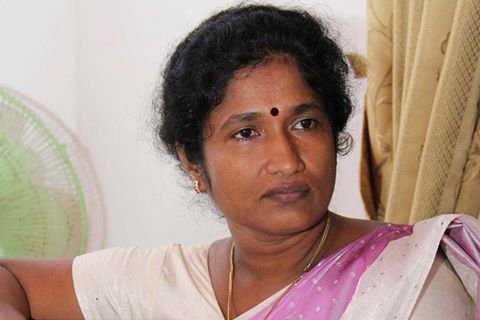
Photo of Ananthy Sasitharan
Writing to the UN High Commissioner, the Secretary General of Eezha Tameizhar Suadchi Kazhakam, Ananthy Sasitharan, and former member of the northern provincial council, M.K. Shivajilingam, urged the UN to take urgent steps to uphold the right self-determination for Tamils and to prevent the recurrence of patterns of violence.
These steps include:
- Referring Sri Lanka to the International Criminal Court.
- Examining the charge of genocide.
- An immediate end to ongoing land grabs and the Sinhalisation of the North-East.
- The demilitarisation of the Tamil homeland.
- The reestablishment of the North-East as the Tamil homeland, as per the Indo-Lanka Accord of 1987, and to conduct provincial elections to ensure Tamils have a democratic voice.
- The immediate repeal of Sri Lanka’s draconian Prevention of Terrorism Act and release of all those who were detained under this bill.
- Coordinate a UN conducted and monitored referendum for the people in the North East to democratically determine the permanent political solution.
Confronting genocide
In their statement they further stressed that the Northern Provincial Council has repeated called on the international community to refer Sri Lanka to the International Criminal Court for the crime of genocide and to find a permanent political through a UN monitored referendum.
They highlight that the genocide in Mullaivaikkal took the lives of an estimated 40,000 Tamil civilians however there is not an accurate count of those who died and some estimates place the figure close to 146,679.
The statement expresses its lack of faith in a domestic process noting that Sri Lankan leaders have “repeatedly and habitually engaged in patterns of deception and reneged on their agreements, promises and commitments to Tamil leaders, the international community, and the UN”. This culminated in February 2021, with the government unilaterally withdrawing from the UN resolution illustrating that it had no intention in implementing these agreements.
This, they note, is indicative of deep anti-Tamil sentiment which solidified immediately after the independence of the country in 1948. It materialised in the anti-Tamil pogroms of 1956, 1958, 1977, 1981, and 1983.
“More than 12 years after the end of the ethnic war, the Tamil region is still being occupied by the Sri Lankan armed forces” they noted. They add that the government continues to be engaged in land grabs as well as Sinhalisation of the North-East.
This illustrates that the “UNHRC system of justice has failed the Tamil people in the last 12 years” and as a result Tamils “are fast loosing hope”. They warn that the failure to ensure justice is establishing “a bad precedent by the UN system of justice in the modern world order”.
Read the full statement here.
We need your support
Sri Lanka is one of the most dangerous places in the world to be a journalist. Tamil journalists are particularly at threat, with at least 41 media workers known to have been killed by the Sri Lankan state or its paramilitaries during and after the armed conflict.
Despite the risks, our team on the ground remain committed to providing detailed and accurate reporting of developments in the Tamil homeland, across the island and around the world, as well as providing expert analysis and insight from the Tamil point of view
We need your support in keeping our journalism going. Support our work today.
For more ways to donate visit https://donate.tamilguardian.com.

